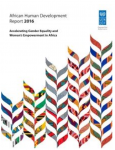The UN Development Programme (UNDP) has released the 2016 edition of the African Human Development Report, which finds that gender inequality jeopardizes Africa's efforts to achieve economic growth, inclusive human development and the Sustainable Development Goals (SDGs).
The report analyzes the economic, political and social drivers that affect women's advancement in Africa, provides recommendations on how to close the gender gap, and proposes two initiatives to promote gender equality.
 28 August 2016: The UN Development Programme (UNDP) has released the 2016 edition of the African Human Development Report, which finds that gender inequality jeopardizes Africa’s efforts to achieve economic growth, inclusive human development and the Sustainable Development Goals (SDGs). The report analyzes the economic, political and social drivers that affect women’s advancement in Africa, provides recommendations on how to close the gender gap, and proposes two initiatives to promote gender equality.
28 August 2016: The UN Development Programme (UNDP) has released the 2016 edition of the African Human Development Report, which finds that gender inequality jeopardizes Africa’s efforts to achieve economic growth, inclusive human development and the Sustainable Development Goals (SDGs). The report analyzes the economic, political and social drivers that affect women’s advancement in Africa, provides recommendations on how to close the gender gap, and proposes two initiatives to promote gender equality.
The ‘African Human Development Report (HDR): Accelerating Gender Equality and Women’s Empowerment in Africa’ finds that African women achieve only 87% of the human development outcomes of men and made only 7 cents for each dollar made by men, in part due to lower levels of female secondary attainment, lower female labor force participation and high maternal mortality. The report observes that this gender gap costs sub-Saharan Africa US$95 billion annually on average and that a 1% increase in gender inequality reduces a country’s human development index (HDI) by 0.75%.
To achieve gender equality, the report proposes four strategic pathways: adopting legal reforms; building national capacity to accelerate women’s involvement in decision making; adopting multi-sectoral approaches in promoting gender equality and women’s empowerment; and accelerating women’s ownership of assets and management of resources.
The report also recommends six enabling actions: using gender equality as an organizing policy lens for all development planning and implementation; tackling destructive social norms; prioritizing gender equality in planning and budgets; ensuring adaptive national institutions to drive a proactive, responsible social framework; valuing data for improved decision making and mid-course corrections, including data disaggregation beyond the national level; and engaging in regional and South-South cooperation in designing and implementing gender-focused policies and initiatives.
The report further proposes a Gender Seal certification to promote and implement gender equality standards in the workplace and an African Women’s Investment Bank.
The launch event took place on the sidelines of the Tokyo International Conference on African Development (TICAD) VI in Nairobi, Kenya. Speaking at the launch, UNDP Africa Director Abdoulaye Mar Dieye observed that “With existing gender disparities, achieving the SDGs and Africa’s Agenda 2063 would remain an aspiration, and not a reality.” He added that “Closing the gender gap would not only set Africa on a double-digit economic growth track, but would also significantly contribute to meeting its development goals.”
Also speaking at the launch, UNDP Administrator Helen Clark underlined that “If gender gaps can be closed in labour markets, education, health, and other areas, then poverty and hunger eradication can be accelerated.” She stressed that achieving gender quality and women’s empowerment “is a development imperative.”
Japan and the Open Society Initiative for West Africa (OSIWA) provided support for the report. [UNDP Press Release] [Publication: Africa Human Development Report 2016] [UNDP Administrator Statement]